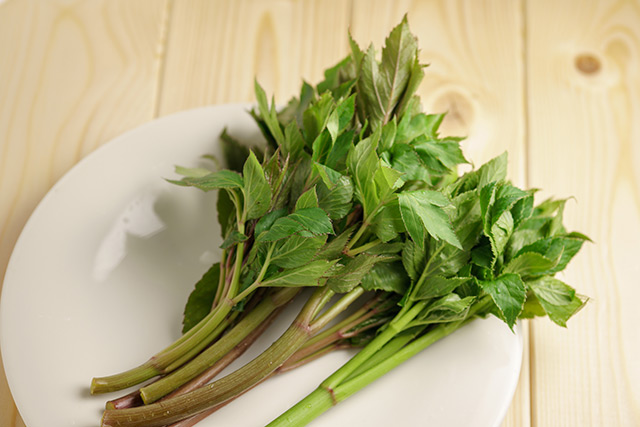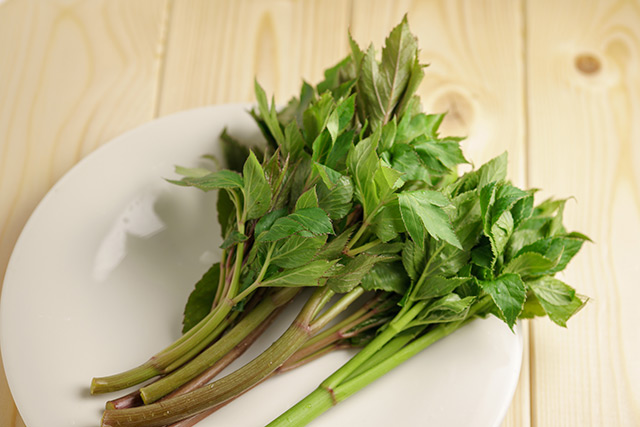Learn about brain health and nootropics to boost brain function
Boost cellular health and prevent aging with this Japanese plant



(Natural News) The ancient Japanese believed that ashitaba leaves can cure several ailments, hence the ashitaba plant played a significant role in Japanese traditional medicine. They used preparations made with ashitaba leaves to treat ailments like heartburn, stomach ulcer, high blood pressure, hay fever, gout, and constipation.
Modern science has now confirmed that the herb native to Japan does have health benefits. According to a recent study, ashitaba contains a compound that boosts cellular regeneration and prevents aging.
Ashitaba contains a compound which can prevent destructive aging in cells
Scientists found that ashitaba contains 4,4′-dimethoxychalcone (DMC), a compound that enhances a cellular mechanism known as autophagy.
“This is a cleansing and recycling process,” explained Frank Madeo, one of the authors of the study and a professor at the University of Graz in Austria. Autophagy removes unwanted cellular garbage like aggregated proteins. This “cleansing” process helps sustain good health on a cellular level by getting rid of cells’ damaged parts, which can build up and lead to cancer.
It is believed that intermittent fasting and exercise can cause autophagy. However, in order to find more ways to induce autophagy, Madeo and his team turned their attention to plants. In particular, their study focused on a plant-based class of chemicals called flavonoids.
Flavonoids are compounds known to have antioxidant and anti-inflammatory properties. These properties give flavonoids the ability to protect against brain degeneration, cancer, and other diseases. (Related: Hesperidin, a flavonoid, can be used to reduce skin damage caused by constant sun exposure.)
| Discover how to prevent and reverse heart disease (and other cardio related events) with this free ebook: Written by popular Natural News writer Vicki Batt, this book includes everything you need to know about preventing heart disease, reversing hypertension, and nurturing your cardiac health without medication. Learn More. |
The researchers screened 180 different types of flavonoids to determine which ones have the ability to counteract age-related cell demise.
After selecting DMC as a candidate, the researchers conducted their experiments on yeast cells. Initial results showed that DMC helped protect yeast cells from the effects of aging. Moreover, DMC performed better than compounds which are known to have anti-aging properties, like resveratrol. Resveratrol is a naturally occurring antioxidant found in the skin of grapes.
The researchers also tested DMC on worms and fruit flies and arrived at the same results.
“Remarkably, chronic DMC treatment… prolonged the median lifespan of both model organisms by approximately 20 percent,” the researchers wrote in their study, which was published in the journal Nature Communications.
When they conducted additional experiments to test the effects of DMC on mouse heart cells, the results they obtained were consistent with those from previous experiments: DMC protected cells via autophagy. It even prevented liver damage caused by ethanol.
Further tests showed that DMC can also protect different types of human cells and slow the aging process.
“The experiments indicate that the effects of DMC might be transferable to humans, although we have to be cautious and wait for real clinical trials,” said Madeo. He added that more studies are needed to determine whether DMC can protect against age-related diseases.
More on ashitaba
Ashitaba is a flowering plant that belongs to the carrot family. When ashitaba leaves are clipped from the stem, they grow back the next day, hence the name “tomorrow leaf.” The Japanese use ashitaba extensively in culinary preparations. Its stem, roots, and leaves are edible and can be added to dishes.
While aging is inevitable, certain steps can be taken to reduce the signs of aging and decrease the risk of age-related diseases. Regular exercise can keep age-related conditions like muscle degeneration and cardiovascular disease at bay. On the other hand, a balanced diet can ensure that the body has enough nutrients to fight diseases. Of course, finding a way to incorporate ashitaba in meals will also improve cellular regeneration and slow down cell aging.
For more news and stories about ashitaba and its uses in traditional medicine, visit Herbs.news.
Sources include:
Click here to view full article